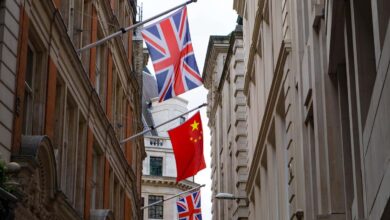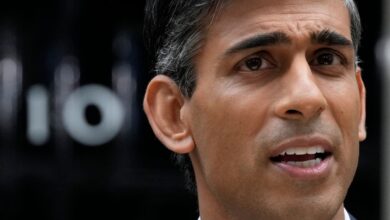More than half of Britons think non-payment of energy bills ‘justified’ as cost of living crisis bites

More than half of Britons (55 per cent) believe an organised campaign of non-payment of energy bills is justified if prices rocket upwards as forecast this winter, according to a new poll.
And almost half (44 per cent) fear that there will be riots if consumers are given no further help with bills expected to top £3,500 from October and £4,000 by the spring.
The findings by pollster Savanta came as former chancellor Rishi Sunak promised “hundreds of pounds more” to the most vulnerable households if he becomes prime minister, while his rival for the Conservative leadership Liz Truss refused to commit to direct payments to those most in need.
The Tory leadership hopefuls – embroiled in an increasingly vicious battle to succeed Boris Johnson – showed no sign of responding to calls from former PM Gordon Brown and the CBI to come together behind an emergency package of immediate help.
But Mr Johnson said he was “absolutely certain” that whoever enters No 10 in September will announce more assistance. He told a reception at Downing Street: “I’m absolutely confident that we will have the fiscal firepower and the headroom to continue to look after people as we’ve done throughout.”
Consumer expert Martin Lewis said that the “zombie” government needs to “wake up” sooner than 5 September, when the new prime minister will be chosen by Conservative party members.
The Money Saving Expert founder warned that the amounts being demanded are “unaffordable for millions”, adding: “People’s livelihoods, mental wellbeing and in some cases very lives depend on this.”
Almost 100,000 people have now signed a pledge with campaign group Don’t Pay UK to cancel energy bill direct debits from 1 October if they are not reduced to an “affordable” level.
Today’s Savanta poll for The Independent found that 7 per cent of consumers say they have already refused to pay their bills in full and a further 19 per cent are considering doing so. Just 35 per cent said that an organised non-payment campaign would be unjustified, with 10 per cent saying they did not know.
Similar numbers said they would be ready to join protests against energy companies, while 29 per cent said they believe civil unrest would be justified as part of the drive for change.
Some 44 per cent said they believed rioting was likely over the coming months as anger grows over the mounting cost of gas and electricity. But just 26 per cent thought it would be an effective way of securing additional help.
By contrast, 50 per cent believed that a payments boycott would be effective, against 40 per cent who thought it would not be.
The author of the book Can’t Pay, Won’t Pay – a history of Margaret Thatcher’s “community charge”, which sparked massive protests leading to her downfall in 1990 – said that the issue could be a “poll tax moment” for the current government.
“Everyone cites the riot in March 1990 and that was quite important because it sent shockwaves across the establishment,” Simon Hannah told The Independent. “But what really stopped the poll tax was that millions of people just didn’t pay it, or didn’t pay it completely.
“It’s a pretty similar social combustible mix, there are lots of people who are struggling on quite low benefits or haven’t had a proper pay increase for over a decade, so I think there is the potential – it’s just that it’s aimed at energy companies rather than the government directly, it has that different dynamic.”
Energy by far topped the list of concerns as Britons brace themselves for a tough winter financially. Some 53 per cent said paying power bills was their greatest worry, followed by paying for food (15 per cent), motor fuel (8 per cent) and rising interest rates (7 per cent).
Despite Ms Truss’s focus on tax cuts over direct payments as a solution to the cost of living crisis, just 5 per cent said that excessive taxation was their biggest financial anxiety.
Some 65 per cent of those questioned – including 75 per cent of over-55s – said they had already started cutting back on energy use in a bid to save money.
Almost half (48 per cent) said they were having to cut back spending on other essentials, like food and clothing, including 49 per cent of the over-55s. A further 22 per cent said they were considering cutting back on gas and electricity and 30 per cent on other essentials in the months to come.





